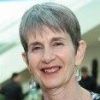An Evening with Rabbi Yitz Greenberg
Wexner Heritage in the Bay Area
The Wexner Heritage Program is a leadership program designed to “expand the vision of Jewish volunteer leaders, deepen their Jewish knowledge and confidence, and inspire them to exercise transformative leadership in the Jewish community.” The Federation’s new Bay Area Wexner Alumni program seeks to further the vision of the original Wexner Heritage Program by strengthening the bonds among the Bay Area Wexner alumni through meaningful events and engagement in the San Francisco Bay Area.
Over 10 years ago, when I studied at my first Wexner Heritage retreat, Rabbi Yitz Greenberg was my Holidays seminar teacher. For those who don’t know him, Rabbi Greenberg is a legendary Jewish thinker, scholar, change-maker, and community builder. His lessons regarding Covenant and B’tselem Elohim were the most impactful of that first experience with the Wexner program.
As a hospice volunteer with the Bay Area Jewish Healing Center and a chaplain intern at a local hospital, these teachings remain some of the most meaningful from my two years of study. So, I was delighted to find out that Rabbi Greenberg was going to be in town to speak to Wexner alumni and teach at Bay Area Limmud at Sonoma State University. I took advantage of both opportunities to see my old teacher teach.
When Rabbi Greenberg spoke to the Wexner alumni this summer, he took the opportunity to discuss the Ethics of Jewish Power. In particular, he was focused on Israel, as a national power. Rabbi Greenberg argued that, as a minority and oppressed people, Jews needed to be empowered in order to survive. The state of Israel is a result. The question now is, how to maintain that power in an ethical way, and how to maximize the good that power can afford while minimizing the bad that inevitably comes with having power. These questions do not only apply to Israel, but to all powerbrokers, in all settings.
Rabbi Greenberg argues that it is necessary for the Jewish state and diaspora to grapple with the questions of ethical power not only for our survival but as an example for others – to be a “light among the nations.” Concerning Israel, in order to maintain or strive to maintain ethical power, he said that there must be political freedom with multiple political parties, judicial review, a free press, a strong cultural tradition (which requires care/concern for the marginalized), and pluralism.
Within the Wexner family, there is strong support for Israel. However, some of us worry about the dialogue that is taking place about Israel; there are fears that the left has moved so far to the left and the right so far to the right that we cannot talk to each other about our concerns for Israel’s survival and for its democracy. Rabbi Greenberg’s thesis of the need for an Ethics of Jewish Power gives us additional tools to begin our conversations. And, if we also remember Rabbi Greenberg’s lesson about B’tselem Elohim, that we are all created in the image of G-d – unique, equal and of infinite value, perhaps we can enter these conversations knowing we have the best intentions for each other and Israel. And we can become a “light to the nations.”
Linda Kalinowski is an alumna of the Wexner Heritage Program’s class of 2003. Linda has spent over 15 years advocating on behalf of domestic violence survivors, currently serving as the board chair of Shalom Bayit, which provides direct services to domestic violence survivors, prevention education to teens and young adults, and outreach to the Jewish community.
For more information on the Wexner Heritage Program, visit its website or contact Maja Loncar, Bay Area Wexner Alumni Program Coordinator at the Federation, at 415.512.6293.


